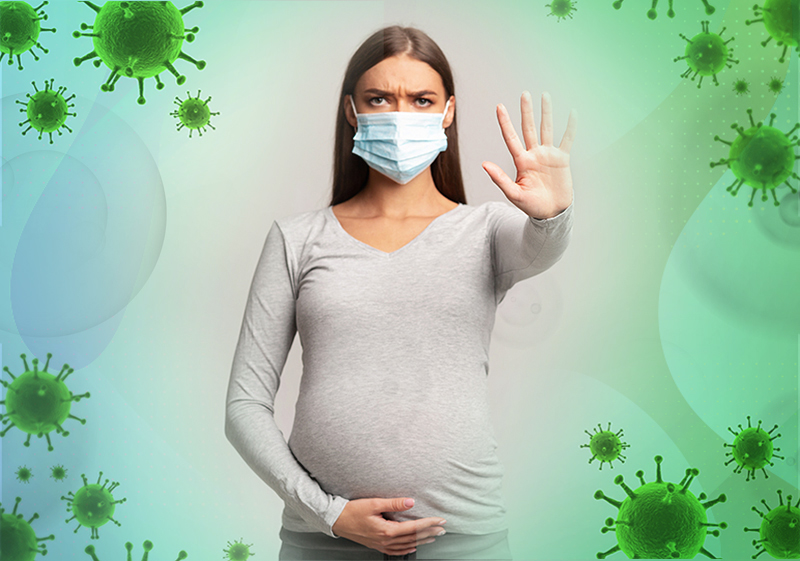


Coronavirus And Pregnancy


Pregnancy concerns associated with the ongoing Coronavirus pandemic and its resulting disease COVID-19 are inevitable for all the new parents and parents-to-be out there. To put your worries at rest, we have addressed some of the most common queries on every parent’s mind in this section. The content is adapted based on guidelines from agencies like CDC, ACOG, RCOG, FOGSI, ICMR and scientific publications so far. However, they are simplified and made user friendly for Indian context. The purpose of this page is to only provide basic information and our viewers are encouraged to follow the instructions of their own healthcare professionals.
Studies have shown an increased risk of miscarriage or premature labor in pregnant women who are severely infected with COVID-19. A small study comprising 10 births in China found that maternal COVID-19 pneumonia was associated with fetal distress and premature labor. So, if you are pregnant and suspect you have COVID-19, you must consult your doctor immediately.
There are 5 important tips that can help prevent the spread of COVID-19. They include:
1. Stay at home
2. Wash your hands at regular intervals
3. Cover your mouth while coughing/sneezing
4. Avoid touching your face
5. Keep a minimum distance of 1 metre from others
Preliminary research suggests that the COVID-19 infection is not transmitted from the mother to child via the placenta or during delivery. Recently in India, a mother who was coronavirus positive gave birth to an infant who tested negative for the infection 10 days post the delivery at the All India Institute of Medical Sciences (AIIMS). This is the first such case in India where a baby was born to a coronavirus positive mother. In another similar report from Wuhan, China, 33 babies born to mothers that were sick with the COVID-19 pneumonia were tested for the infection. Three of these babies, even though they were delivered via cesarean section, were diagnosed with mild signs of COVID-19 as newborns; although they recovered completely within a week. Since a mother infected with COVID-19 can transmit the virus to her newborn via close contact, it is advised that she is separated from the baby until she recovers.
Presently, pregnant women are tested for COVID-19 with RT-PCR using their nasal swab sample, which is the same testing criteria used for other adults. It is essentially meant for those with symptoms of an acute respiratory illness who have had recent history of travel, possible exposure to the infection, or contact with a healthcare worker.
According to the limited data available, pregnant women do not seem to be at increased risk of getting severely sick with COVID-19. As seen with the general population, the risk factors for more severe disease may be found in pregnant women too. If the pregnant woman has comorbid conditions such as diabetes, hypertension, obesity, respiratory disease or is of advanced age, she is more likely to have a severe form of respiratory disease if she is infected with COVID-19. If you are pregnant during the coronavirus pandemic, you should follow strict precautions to avoid exposure to COVID-19. If you are pregnant and suspect that you have COVID-19, inform your doctor immediately.
Most pregnant women infected with COVID-19 are observed to have mild to moderate flu-like symptoms of cough, sore throat, and fever. These symptoms are common to other adults who have developed the infection. Few of these women have also been observed to exhibit difficulty in breathing or shortness of breath. Pregnant women, especially those with associated medical diseases (diabetes, asthma, or other such conditions) may present with pneumonia and marked hypoxia (an absence of enough oxygen in the tissues to sustain bodily functions). Immunocompromised and elderly pregnant women may present with atypical features such as fatigue, malaise, body ache and/or gastrointestinal symptoms like nausea and diarrhoea.
While it is unknown whether newborns with COVID-19 are at increased risk for severe complications, transmission of the disease post birth via direct contact with the mother is a concern. At present, testing is recommended if the mother has COVID-19 infection or if the baby is symptomatic. Facilities must consider temporary separation (e.g. separate rooms) of the mother who has confirmed COVID-19 or is a Person Under Investigation (PUI), from her baby until the mother’s transmission-based precautions are discontinued.
Postnatal care of the mother infected with COVID-19 should include continued medical evaluation for respiratory status and standard practices of routine postnatal care. She should be encouraged to maintain the good practices of hygiene related to the puerperium and hand hygiene. Advice should include management of engorged breasts when feeding and measures to enhance breastfeeding after the isolation period is completed. She should also be encouraged to consume a healthy, nutritious diet to recover from the infection and build immunity. The mother who is still recovering from the infection and/or is isolated from the infant may be at risk for developing anxiety, postpartum depression and other mental health issues. She should thus be offered counseling and psychological support.
Diet has been the subject of numerous controversies in the wake of the COVID-19 pandemic. For most pregnant women, there is limited evidence that any dietary substances may improve immune status and reduce infection risk. Based on such limited evidence, dietary advice is generic and would include a high protein diet in addition to supplementation with vitamins and micronutrients. Natural sources of these are called superfoods in common parlance and include citrus fruits, ginger, garlic, broccoli, turmeric, oregano oil and spinach. While most of the above lack robust evidence, taking these measures will not do any harm. Thus, they should be judiciously used in consultation with the treating doctor.
Coronavirus And Cord Blood Banking


Medical scientists are learning more every day about the coronavirus. Among the questions about the pandemic and the COVID-19 disease are some pertaining to umbilical cord blood banking. LifeCell has prepared known answers for commonly asked questions.
As per the current published studies, mothers infected by COVID-19 at the time of delivery cannot transmit the infection to the umbilical cord blood or the birth tissues. In one such study that was conducted in Wuhan, China, nine pregnant women who had tested positive for COVID-19 delivered their babies via C-section. The newborns were immediately kept in the sterile operating room away from their mothers and their amniotic fluid, cord blood, and throat swabs were collected for testing along with the breast milk of all the mothers. All of these samples tested negative for COVID-19. Hence, if a mother has COVID-19 during her pregnancy or even during birth, she need not worry about transmitting the virus to the umbilical cord blood.
Cord Blood Banking is safe and LifeCell has made it safer by modifying its Maternal Health History and Antenatal History Questionnaire to obtain and document a detailed travel history, history of exposure to people with symptoms of COVID-19, and development of symptoms of COVID-19 and immunocompromised conditions, prior to banking their newborn’s stem cells. This is our voluntary precautionary measure even though the current studies show that the coronavirus is not expected to appear in the umbilical cord blood. The philosophy is to collect the information now in case it becomes important later. Currently, there are no regulatory requirements necessitating the same. We have not had to change our collection procedures because the cord blood is collected by our trained staff under the supervision of the attending obstetrician inside a sterile delivery room anyway. We are closely monitoring and following national and international best practices across our laboratories and offices to mitigate risks associated with Coronavirus Disease 2019 (COVID-19).
Additionally, LifeCell has also launched the COVID-19 Testing for Asymptomatic Pregnant Women as per the recent ICMR Recommendation in Association with ICMR Approved Partner Laboratories.
- Currently, the services would be available only in Mumbai, Pune, Chennai, Bengaluru, Delhi, Nasik, Nagpur, Kolhapur, Aurangabad and Ahmedabad with more cities being added periodically.
- The test will be done only upon a Qualified Doctor's Prescription.
- Our Customer Care team will call the responses and share the payment link to Clients. They will also collect 3 documents to initiate the process: Doctor’s Prescription, Government Photo ID Proof, Duly Filled Clinical Information Form From Partner Lab.
- Sample collection will be done by a trained technician from the partnered lab wearing PPE (Personal Protective Equipment).
- Reports shall also be taken care of Hence, you can be completely assured about the safety and quality of the umbilical cord blood stem cells banked with LifeCell.
- TAT for Report is 24 hours.
- Test fees is only INR 4500/-
- For more information click here: https://www.lifecell.in/covid-19-test-at-home
Reference: https://main.icmr.nic.in/sites/default/files/upload_documents/COVID19_Testing_Strategy_for_Pregnant_Women.pdf
The samples that have already been cryopreserved are not impacted by the current novel coronavirus or its resulting disease, COVID-19. As part of the standard operating procedures of LifeCell, multiple safety and security measures are in place to help ensure the long-term protection of the stored samples. The systems designed in the lab include two safeguards to avoid cross-contamination of cord blood samples: (a) each sample is initially processed individually in a closed system and hermetically sealed in a plastic overwrap before it is cryopreserved. (b) storing the samples in vapor-phase of liquid nitrogen prevents any potential transmission of viruses and other contaminants. Adequate facility design considerations, running of regular stability testing programs, maintenance of samples at multiple locations and procurement of insurance helps in providing added confidence to our Clients. Additionally, our systems perform equipment checks, along with environmental and sample sterility tests every year. Samples in storage are safe from contamination. We want to assure you that LifeCell is doing everything possible to maintain business as usual for our Clients. For any further queries about your stored sample(s), please call our Customer Service team on 18002665533.
Even in normal times, pregnant mothers are routinely tested and screened to determine if they might have any disease that would affect the collection of their baby’s cord blood. Cord blood banking is safe and LifeCell has made it safer during the pandemic by screening the medical histories of pregnant mothers.
There are no known reports of coronavirus transmission in a stem cell transplantation. In fact, there has never been a documented case till date in which any kind of respiratory virus has been transmitted to a patient by implantation, transplantation, infusion or other transfer of cells or tissues.
LifeCell's cord blood banking service is an essential service that needs to continue its operations despite the lockdown. Our tough stainless-steel collection kit is quite rugged and protects the precious cord blood samples during transportation. This led us to create a communication channel at LifeCell which is similar to what we see in relay races. We leveraged our vast network presence across 200+ cities which comprises different sales personnel, paramedic and logistics teams in every small-medium-large city. This allowed us to move the samples from point A to point B via road until the samples reached a metropolitan city. From there the cargo flights further helped in the transportation of samples safely to our processing facility situated in Chennai, Tamil Nadu. During the lockdown, until mid of April 2020, LifeCell has been able to store 2200+ cord blood samples, ensuring that our clients do not have to worry about securing their baby and family’s future health with us.
The current coronavirus pandemic has not caused any changes to LifeCell’s laboratory operations. Once the sample reaches our laboratory in Chennai, Tamil Nadu, it is managed with routine standard protections including, but not limited to, our staff wearing protective equipment and handling the samples under a hood that maintains a sterile field. The technicians have been assigned to teams that do not have contact with each other. Common areas at the workplace, such as locker rooms or break rooms, are cleaned repeatedly with medical-grade disinfectant. The staff members either work remotely or stay socially distant. Our lab is operational 24×7, with our team staying at the lab accommodation and not meeting their families for days together to help us process the samples in a quick and efficient way.
The readily available unrelated cord blood units have been used by many patients worldwide who weren’t able to find matching bone marrow/peripheral blood stem cell donors, due to the ongoing coronavirus pandemic. A donor may not be available because of exposure to the virus or lack of a functioning center for donation due to repurposing of medical facilities to care for COVID-19 patients. Because cord blood units are safe and quickly available, the major transplant donor registries are recommending that a back-up cord blood unit be identified for all patients undergoing workup for blood or marrow transplant.
Coronavirus And Potential of Stem Cells To Combat COVID-19


Stem cells have been creating quite a stir in the healthcare industry owing to its growing potential in the possible treatment of COVID-19. Multiple therapeutic companies have begun clinical trials using stem cells for the management of the symptoms associated with the infection. This section is to keep you updated about everything related to stem cells and coronavirus and its resulting disease - COVID-19
Further Readings:
- Government of India, Ministry of Health & Family Welfare, Directorate General of Health Services (EMR Division). Revised Guidelines on Clinical Management of COVID-19. [Online] March 31, 2020. Accessed on April 5, 2020.
- Guidance for Management of Pregnant Women in COVID-19 Pandemic ICMR ICMR & National Institute for Research in Reproductive Health - http://www.nirrh.res.in/guidance-for-management-of-pregnant-women-in-covid-19-pandemic/
- The Federation of Obstetric and Gynaecological Societies of India. Good Clinical Practice recommendation on Pregnancy with COVID-19 Infection; Version 1; [Online] March 28, 2020. Accessed on April 5, 2020.
- Parents Guide To Cord Blood Foundation: https://parentsguidecordblood.org/en/news/coronavirus-during-pregnancy-and-cord-blood-banking
- The Royal College of Midwives, Royal College of Obstetrics and Gynaecology, Royal College of Paediatrics and Child Health, Royal College of Anaesthetists. Coronavirus COVID-19 Infection in Pregnancy; Version 5. [Online] March 28, 2020. Accessed on April 5, 2020.
- Favre G, Pomar L, Qi X, Nielsen-Saines K, Musso D, Baud D. Guidelines for pregnant women with suspected SARS-CoV-2 infection. Lancet Infectious Diseases 2020 pii: S1473-3099(20)30157-2. [Online] March 3, 2020. Accessed on April 5, 2020.
- American College of Obstetricians and Gynecologists. Novel Coronavirus 2019 (COVID-19) Practice Advisory [Online] March 13, 2020. Accessed on April 5, 2020.
- Centres for Disease Control and Prevention. Interim Considerations for Infection Prevention and Control of Coronavirus Disease 2019 (COVID-19) in Inpatient Obstetric Healthcare Settings. [Online] April 4, 2020. Accessed on April 5, 2020.
- Chawla D, et al. Perinatal-Neonatal Management of COVID-19 Infection. Indian Paediatrics 2020 pii: S097475591600154. [Online] April 1, 2020. Accessed on April 5, 2020.
- Cord Blood Association: FAQs On COVID-19 And Stem Cell Banking - https://cord.memberclicks.net/answers-to-questions-about-banking-during-the-coronavirus



